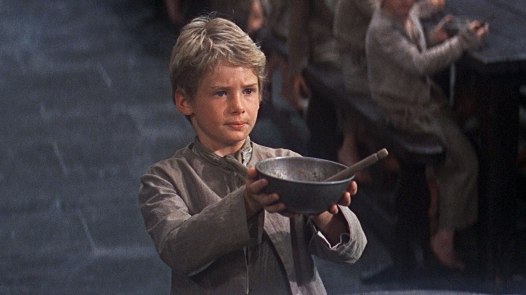(Editor’s note: This is the ninth part in a multi-part series on the winners of the Academy Award for Best Picture. They are being presented in chronological order with “Wings,” the first winner, included among the movies reviewed and/or described in the first part.)
The five Oscar winners for Best Picture winners between 1968 and 1972 all had a certain edgy quality to them, even the musical “Oliver,” based on a Charles Dickens book and the stage musical, fits that description.
Those films were certainly reflective of the times with social upheavals, the U.S. presidency of Richard M. Nixon, the ongoing Vietnam War and many other issues shaking the times.
Oliver!, 1968, directed by Carol Reed

“Oliver!,” the 1968 Academy Award Best Picture winner, not only leaves one humming some of its tunes, but thinking about some of the issues the story raises.
Based on Charles Dickens’ “Oliver Twist,” the movie is story is about a young boy swept into a gang of youthful thieves. It’s a story about poverty, too, and what it forces some people to do. That is still a very relevant issue today at it was in 1968 and when Dickens novel was first published as a serial between 1837–39.
At a little more than 2-1/2 hours, Oliver! is plenty of entertainment per entertainment dollar in addition to being thought-provoking. The memorable songs include “Consider Yourself Part of the Family,” “I’ll Do Anything,” “Food Glorious Food,” and “As Long as He Needs Me.”
The cast includes Ron Moody, Shani Walls, Oliver Reed, Mark Lester, Jack Wild and Hugh Griffith.
Other contenders for Best Picture in 1968 included “Funny Girl,” “The Lion in Winter,” and “Romeo and Juliet.”
Midnight Cowboy, 1969, directed by John Schlesinger
Although its original rating has been changed, “Midnight Cowboy” is the only Best Picture winner with the distinction of having a “X” rating when it was first released.
The film had been approved with an “R,” but after United Artist executives consulted a psychologist who said that the “homosexual frame of reference” and its “possible influence upon youngsters,” the studio agreed to accept the X rating. The Motion Picture Association of America ultimately changed its rating system and the movie got its R rating.
This is a gritty film about a naive, young Texas man, played by Jon Voight, who thinks he can make a great living as a gigolo in New York City. Once there, he meets the street-savvy, homeless, dying Ratso, played by Dustin Hoffman.
In “Midnight Cowboy,” Hoffman as Ratso yells one of the all-time classic movie lines as he walks across NYC street traffic: ” “I’m walkin’ here!” That line reached No. 27 on the American Film Institute’s “100 Years…100 Movie Quotes.” Additionally, the song “Everybody’s Talkin’,'” which is featured throughout the movie, won Harry Nilsson a Grammy Award for Best Male Vocal Performance
In many ways, this is a very down movie, but sadly the story of beautiful dreams destroyed by harsh realities is still a true story for many people today.
The other contenders for the 1969 Best Picture Award included “Anne of the Thousand Days,” “Butch Cassidy and the Sundance Kid,” “Hello Dolly,” and “Z.”
Patton, 1970, directed by Franklin J. Schaffner
The Academy Award Best Picture winning “Patton” is described as a milestone in screen bio-pics by many critics.

George C. Scott extensively studied the brilliant, eccentric Gen. George S. Patton in preparing for the role. Scott displays the brilliance and the temper of the general, who was a major figure in World War II.
Scott, who won the Best Actor Award, had refused the Oscar nomination but won the award anyway. In a letter to the Academy, he stated that he did not feel himself to be in competition with other actors.
In addition to Scott, actors in the film included Karl Malden, Stephen Young and, if you dig further down in the credits, Tim Considine.
Other contenders for the 1970 Best Picture award included “Airport,” “Five Easy Pieces,” and “M*A*S*H.”
The French Connection, 1971, directed by William Friedkin
“The French Connection,” the 1971 Best Picture winner, is a high-energy, landmark film about international smuggling of heroin into New York City and a maverick detective’s efforts to try to stop it.
The great chase scenes through NYC streets are among the greatest in film history, which earned the film editors a well-deserved Oscar.. You will catch yourself moving back and forth in your seat (if you can manage to stay in it) trying to dodge the cars.
Gene Hackman is the star of this film, but the great cast also includes Fernando Rey, Roy Scheider, and Tony LoBianco.
Other nominees for the 1971 Best Picture honor included “Clockwork Orange,” “Fiddler on the Roof,” “The Last Picture Show,” and “Nicholas and Alexandra.”
The Godfather, 1974, Francis Ford Coppola
Hollywood has given us many notable gangster or mob films, but the two Oscar Best Picture winning “Godfather” movies gave us a greater sense of that world than ever before.
“The Godfather,” 1972, and “The Godfather Part 2, 1974, hold the distinction of being the only films that both the original and the sequel won the Academy Award for Best Picture.
In the first movie, we see Marlon Brando as Vito Corleone, the “godfather,” in a role that some critics view as his greatest film performance. The other members of this great cast include Al Pacino, James Caan, Diane Keaton, Talia Shire, Robert Duvall, Sterling Hayden, Abe Vigoda, singer Al Martino, and Alex Rocco.
This is a story about gangsters, but also one about families, not just crime families but in this case about Italian families seeking their version of the American dream and power.
It’s hard to imagine any other movie winning the 1972 Oscar for Best Picture than this Francis Ford Coppola masterpiece, but the other contenders included “Cabaret,””Deliverance,” “Sounder.”

